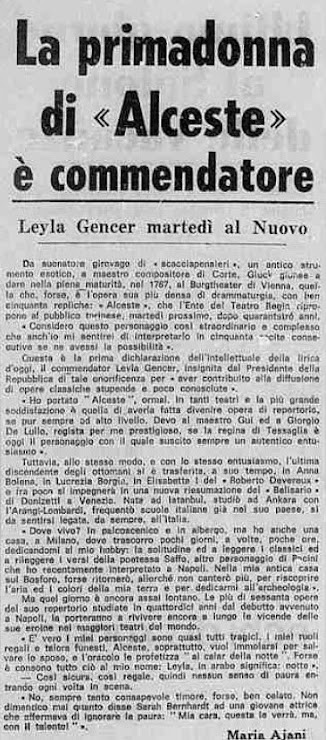ALCESTE
Christoph Willibald Gluck (1714 - 1987)
Opera in three acts in French
Libretto: Ranieri da Calzabigi
Premièr at the Burgtheater, Vienna - 26 December 1767
Premièr at the Burgtheater, Vienna - 26 December 1767
04, 06, 09 March 1969
Teatro Nuovo, Torino
Conductor: Franco Capuana
Chorus master: Antonio Brainovich
Stage director: Tito Shipa Jr. from Giorgio de Lullo
Scene and costumes: Pier Luigi Pizzi
Alceste LEYLA GENCER soprano
Admeto MIRTO PICCHI tenor
Grand Sacerdote ATTILIO D'ORAZI tenor
Apollo GIANNI ANTONINI bass
Evandro GIUSEPPE BAROTTI tenor
Ismene SUSANNA GHIONE soprano
Banditore GIULIANO FERREIN bass
L’Oracolo GIULIANO FERREIN bass
Corifee W. GARAVELLI
Corifee C. PERINO
Corifee S. RUPIANI
Time: Ancient
Place: Pherae
OPERA MAGAZINE
1969 January
LA STAMPA
1969.03.02
STAMPA SERA
1969.03.04
LA STAMPA
1969.03.05
LA STAMPA
1969.03.05
MASSIMO MILLA
Anyone who wonders why this Turkish lady whose voice isn’t even beautiful, has become indispensable for the Italian opera in only ten years, whose name is found on the opera posters that vary from Cherubini to Donizetti and Verdi operas and whithout whom it seems like all will collapse; should come here and listen to her. In the dramatic high notes, her voice vibrates like an over revving engine and gives us the feeling that it’s likely to burst but however, her low tones are extremely beautiful, warm, thrilling, sweet and soft. Yet she sings passionately as if she possesses a beautiful voice, she pushes the boundaries and since she has all the rest such as musical and dramatic intelligence; she succeeds…Gencer touches the audience deeply: she presents Gluck’s classical image in such a natural and up-to-date way, far from the intimidating cultural manipulation. She presents it as if it comes from an antic or mythological memory of common knowledge.
LA STAMPA
1969.03.09









